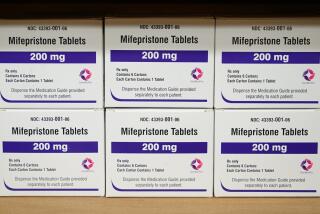Court Widens Study of Drug Tests at Work : Justices to Decide if Railroad Can Make Scrutiny Routine
- Share via
WASHINGTON — The Supreme Court, beginning its new term today, announced it will expand its study of drug testing in the workplace, agreeing to decide whether a railroad may require workers to take the tests routinely.
The court began its 1988-89 term in a whirl of activity, acting on about 1,000 cases in its first day. Before the term ends, it is expected to hand down important decisions on such other issues as civil rights, affirmative action and the death penalty.
In today’s drug-testing case, the justices said they will review a ruling that barred the Consolidated Rail Corp., or Conrail, from imposing the tests without permitting collective bargaining over the issue.
Conrail-Amtrak Crash
The court announced earlier this year that it would review two other drug-testing cases--one involving railway workers and the other the U.S. Customs Service.
In the Conrail case, the railroad announced in February, 1987, that it unilaterally would check for drugs as part of a urinalysis administered periodically to workers and also when they returned to work after an absence.
The railway said the need for the tests was magnified by an accident at Chase, Md., on Jan. 4, 1987, in which an Amtrak passenger train collided with Conrail locomotives, killing 16 people and injuring 174. The Conrail engineer and brakeman subsequently were found to have been using marijuana.
Customs Service Tests
In the earlier railway case, the justices will decide whether constitutional privacy rights of workers are violated by federal regulations requiring blood and urine tests for those involved in serious train accidents.
The Customs Service tests are conducted for those seeking drug enforcement jobs.
Today’s action significantly expands the scope of the court’s review by including a case in which a private company--rather than the government--is adopting mandatory drug tests.
Other Action Today
All three cases will be decided in the court’s new term, which will conclude by July.
In other action today, the court:
--Agreed to decide whether displays of a Christmas Nativity scene and a menorah, symbolizing the Jewish holiday of Hanukkah, should be allowed at two government buildings in Pittsburgh.
--Agreed to decide whether states may be sued in federal court by parents seeking to enforce a law aimed at assuring adequate education for handicapped children.
More to Read
Sign up for Essential California
The most important California stories and recommendations in your inbox every morning.
You may occasionally receive promotional content from the Los Angeles Times.













